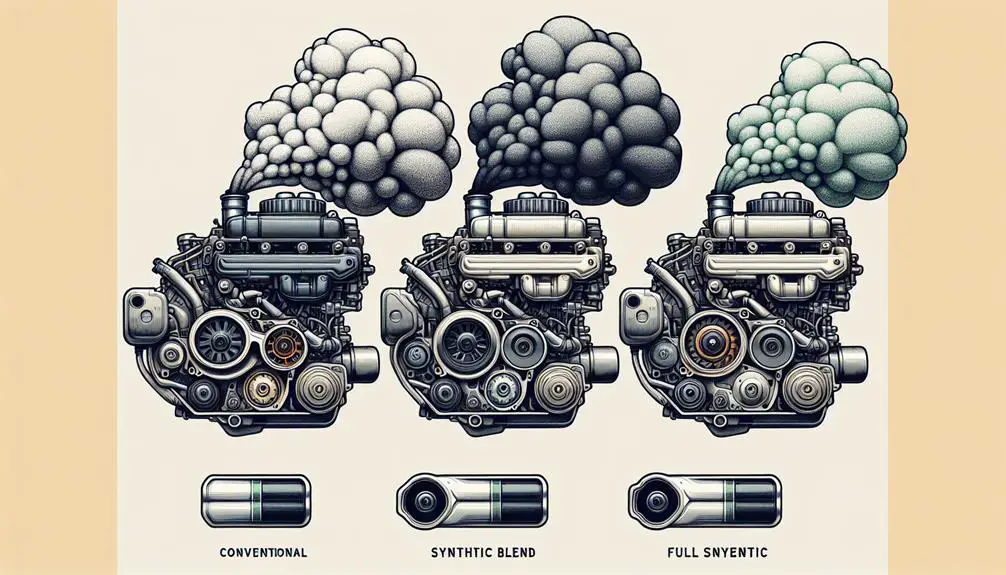When it comes to motor oils, there's a complex web of interactions that might surprise you. The subtle ways these oils can impact the environment are often overlooked, but their implications are far-reaching. From the moment you start your engine, a chain reaction is set in motion that affects various aspects of our ecosystem. Curious to explore the hidden environmental consequences beyond what meets the eye?
Key Takeaways
- Conventional motor oils harm ecosystems with toxic leaks and pollution.
- Air pollution from combustion releases CO2, NOx, and particulate matter.
- Water contamination risk threatens marine life, ecosystems, and drinking water.
- Energy-efficient production and disposal reduce environmental impact.
- Wildlife faces health issues, habitat destruction, and population declines from oil exposure.
Impact of Conventional Oil on Ecosystems

Conventional motor oil can have detrimental effects on ecosystems due to its toxic components and potential for leaks into the environment. When you use conventional oil in your vehicle, you contribute to the pollution of our precious ecosystems. The toxic chemicals in conventional oil can seep into the soil and water, harming plants, animals, and aquatic life. These pollutants disrupt the natural balance of ecosystems, leading to devastating consequences for biodiversity.
By choosing alternative eco-friendly motor oils, you can break free from the cycle of environmental harm. Opt for biodegradable or synthetic oils that are less harmful to the environment. Making this switch empowers you to take a stand against the pollution caused by conventional oils. You have the power to make a difference and protect our ecosystems for future generations.
Together, we can work towards a cleaner, healthier planet by making conscious choices that prioritize environmental well-being over convenience. Join the movement for eco-conscious transportation and be a part of the solution to protect our ecosystems from the harmful effects of conventional motor oils.
Air Pollution From Conventional Oil
When you burn conventional oil in your vehicle, it releases emissions that contribute to air pollution. These emissions can negatively impact air quality in your community.
Understanding the impact of combustion emissions is crucial for addressing air pollution concerns related to conventional oil use.
Emissions From Combustion
The combustion of motor oils, particularly conventional varieties, contributes greatly to air pollution through the emission of harmful gases and particles.
When you use conventional motor oils, you're directly contributing to the following:
- Carbon Dioxide (CO2) Emissions: Every time you drive with conventional oil, you're releasing CO2 into the atmosphere, a major contributor to climate change. By choosing more environmentally friendly options, you can reduce your carbon footprint and help combat global warming.
- Nitrogen Oxides (NOx) Release: Conventional motor oils also produce nitrogen oxides when burned, which can lead to smog and respiratory issues. Opting for cleaner alternatives can help improve the air quality in your community and protect your health.
- Particulate Matter (PM) Pollution: Combusting conventional oils releases tiny particles into the air that can be harmful when inhaled. Making the switch to low-emission or synthetic oils can significantly decrease the amount of particulate matter entering the atmosphere, promoting cleaner air for all.
Impact on Air Quality
Burning conventional motor oils greatly degrades air quality by releasing harmful gases and particles into the atmosphere. When you use these oils in your vehicle, you contribute to the emission of pollutants like nitrogen oxides, volatile organic compounds, and particulate matter. These pollutants can lead to the formation of smog, acid rain, and respiratory issues for you and those around you. As these substances mix in the air, they create a toxic cocktail that affects not only the environment but also public health.
Conventional motor oils contain additives and compounds that, when burned, release greenhouse gases like carbon dioxide, contributing to climate change. Choosing eco-friendly motor oils or synthetic options can help reduce these harmful emissions, promoting cleaner air and a healthier environment.
Water Contamination Concerns

To address water contamination concerns related to motor oils, it's essential to understand their potential impact on the environment. Motor oils pose a significant threat to water bodies, seeping into the ground and eventually reaching rivers, lakes, and oceans.
Here are three reasons why water contamination from motor oils should be a cause for concern:
- Marine Life Suffering: Motor oil spills can have devastating effects on marine ecosystems, leading to the suffocation and poisoning of aquatic life. Imagine fish struggling to survive in oil-polluted waters, their habitats destroyed, and their populations dwindling.
- Drinking Water at Risk: Contaminated water sources can endanger human health, affecting communities that rely on these water bodies for drinking water. Picture the fear and uncertainty that arises when the water you depend on for survival becomes tainted by motor oil pollutants.
- Ecosystem Disruption: Water contamination disrupts the delicate balance of ecosystems, causing long-lasting damage to plants, animals, and the environment as a whole. Visualize the disruption of a once-thriving ecosystem, now struggling to recover from the harmful effects of motor oil pollution.
Energy Consumption in Production
Minimizing energy consumption during production can greatly reduce the environmental footprint of motor oils. When manufacturers prioritize energy-efficient practices, they contribute to a cleaner and more sustainable future. By utilizing renewable energy sources, optimizing production processes, and investing in innovative technologies, the energy intensity of motor oil production can be markedly lowered.
Choosing to power production facilities with renewable energy, such as solar or wind power, can substantially decrease the carbon emissions associated with manufacturing motor oils. Implementing energy-saving measures like upgrading equipment, improving insulation, and enhancing heating and cooling systems can further reduce energy consumption during the production process.
Additionally, investing in cutting-edge technologies like automation and advanced monitoring systems can help streamline operations, leading to lower energy usage.
Disposal Challenges of Conventional Oil

When dealing with conventional oil, disposing of it poses significant challenges regarding environmental impact and sustainability. Improper disposal can lead to contamination of soil, water sources, and harm to ecosystems.
Here are three reasons why the disposal of conventional oil demands your attention:
- Vital: Conventional oil contains harmful chemicals and heavy metals that can seep into the ground, polluting the soil and affecting plant life. This toxicity can disrupt the balance of ecosystems and harm living organisms.
- Guarantee: Improperly disposed of conventional oil can find its way into water bodies, contaminating them and endangering aquatic life. The pollution of water sources not only affects wildlife but also poses risks to human health if consumed.
- Long-lasting Effects: The effects of improper disposal of conventional oil are long-lasting. Once contamination occurs, it can be challenging and costly to clean up, leaving a detrimental legacy for future generations to bear.
Taking responsibility for the proper disposal of conventional oil is essential to mitigate its environmental impact and ensure a sustainable future for all.
Wildlife Effects of Conventional Oil
You need to understand the significant impact conventional oil can have on wildlife.
Oil spills can make animals extremely vulnerable and disrupt entire ecosystems.
Consequences of oil spills can be devastating, affecting wildlife populations for years to come.
Wildlife Vulnerability to Oil
Wildlife populations are particularly susceptible to the detrimental effects of conventional motor oils in their environment. When oil spills occur, the impact on wildlife can be devastating. Here's why:
- Habitat Destruction: Oil spills can contaminate habitats, making them uninhabitable for wildlife. Animals lose their homes and food sources, leading to displacement and starvation.
- Toxicity: Oil contains harmful chemicals that can poison and disrupt the reproductive systems of animals. This toxicity can have long-lasting effects on wildlife populations, threatening their survival.
- Physical Harm: Animals exposed to oil can suffer from skin irritation, organ damage, and respiratory issues. The oil can also weigh down feathers or fur, making it difficult for animals to regulate their body temperature or fly/swim effectively.
Understanding the vulnerability of wildlife to oil pollution is crucial for taking action to protect these creatures and preserve biodiversity.
It's essential to advocate for eco-friendly practices to prevent further harm to our precious wildlife.
Ecosystem Impacts of Oil
The presence of conventional motor oils in ecosystems can have significant adverse effects on wildlife populations. When these oils enter water bodies or soil, they can disrupt the balance of the ecosystem, posing risks to the creatures that inhabit these environments. Wildlife such as fish, birds, and mammals can be directly impacted by the toxic components of conventional oils, leading to health issues and population declines.
Animals may accidentally ingest oil-contaminated food or water, leading to poisoning and death. Additionally, exposure to oil can harm the respiratory, reproductive, and immune systems of wildlife, affecting their ability to survive and reproduce.
The contamination can also destroy habitats, making it challenging for species to find shelter, food, and safe breeding grounds.
To protect the wildlife in ecosystems, it's essential to minimize the use of conventional motor oils and properly dispose of them. Choosing environmentally-friendly alternatives and implementing responsible oil management practices can help preserve the delicate balance of nature and safeguard the diverse wildlife populations that call these ecosystems home.
Oil Spill Consequences
Spilled conventional oil can devastate wildlife populations by contaminating their habitats and threatening their health and survival. When oil spills occur, the consequences for wildlife are severe, impacting not only individual animals but entire ecosystems.
Here's how oil spills affect wildlife:
- Immediate Harm: Animals exposed to oil may suffer from skin irritation, respiratory issues, and ingestion of toxic substances, leading to immediate distress and sometimes death.
- Long-Term Effects: Even after the visible signs of an oil spill have dissipated, wildlife populations can still suffer from long-term consequences such as reduced reproductive success, genetic mutations, and chronic health problems.
- Ecosystem Disruption: Oil spills can disrupt food chains, causing imbalances in predator-prey relationships and leading to population declines in various species, creating long-lasting repercussions throughout the ecosystem.
For those striving for liberation and environmental justice, advocating for stricter regulations on oil transportation and promoting sustainable energy alternatives are essential steps to prevent further harm to wildlife and their habitats.
Carbon Footprint Comparison

Comparing the carbon footprints of different motor oils can provide valuable insight into their environmental impact. By understanding the amount of carbon dioxide and other greenhouse gases emitted during the entire life cycle of a motor oil, you can make more informed choices that align with your eco-conscious values.
Check out the table below for a quick comparison of the carbon footprints of commonly used motor oils:
| Motor Oil Type | Carbon Footprint (kg CO2e per liter) |
|---|---|
| Conventional | 2.5 |
| Synthetic | 1.8 |
| Bio-based | 0.5 |
| Recycled | 0.3 |
| Electric Vehicle | 0.0 |
As you can see, opting for bio-based, recycled, or electric vehicle motor oils can significantly reduce your carbon footprint compared to using conventional or synthetic oils. Making this switch is a simple yet impactful way to contribute to a greener future.
Frequently Asked Questions
Can Motor Oil Be Recycled at Home?
Yes, you can recycle motor oil at home. It's crucial to handle it carefully and follow proper disposal methods.
Start by collecting the used oil in a clean container. Then, find a local recycling center or auto shop that accepts used motor oil for recycling.
What Are the Alternatives to Conventional Motor Oil?
Looking for alternatives to conventional motor oil? Consider synthetic blends or bio-based oils. These options provide efficient lubrication while being more eco-friendly.
Switching to these alternatives can reduce your environmental impact without sacrificing performance. Make a conscious choice that aligns with your values and helps support a greener future.
How Does Motor Oil Impact Marine Life?
Motor oil's impact on marine life is devastating. It can coat sea creatures, disrupt ecosystems, and harm delicate underwater habitats.
Imagine a world where marine life thrives without the threat of oil pollution. By understanding how motor oil seeps into waterways, you can take action to protect our oceans.
Choose eco-friendly oils to reduce harm and preserve the beauty of our seas for future generations.
Are There Regulations on Motor Oil Disposal?
Yes, there are regulations on motor oil disposal in place to protect the environment. You should always dispose of motor oil properly by taking it to designated collection centers or recycling facilities.
Pouring oil down drains or into the ground can harm ecosystems and water sources. By following these regulations, you can help prevent pollution and contribute to a cleaner environment for all.
Can Motor Oil Pollution Be Reversed?
You can't reverse motor oil pollution entirely once it's out there, but there are ways to minimize the impact and prevent further damage.
Taking steps like proper disposal, using eco-friendly oils, and supporting clean-up efforts can all help in reducing the harm caused by motor oil pollution.
It's about being proactive and making conscious choices to protect the environment for future generations.
Conclusion
You've learned about the devastating environmental impact of conventional motor oils on ecosystems, air quality, water bodies, and wildlife.
It's time to make a change and switch to eco-friendly alternatives to protect our planet.
Don't underestimate the power of your choices – they've the potential to make a world of difference.
Let's work together to save the Earth, one drop of oil at a time.
